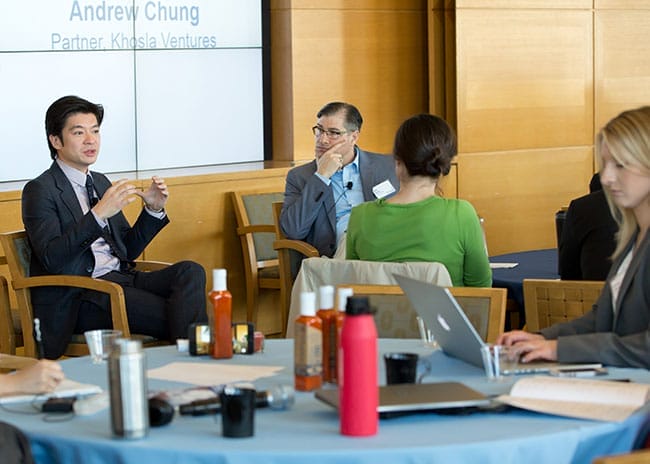Andrew Chung WG06 shared details of how Silicon Valley venture capital firm Khosla Ventures is leading the way in cleantech investing. As a Khosla partner, Chung should know.
Khosla’s definition of “cleantech,” first off, is not limited to just energy sources; it encompasses any and all technology that allows us as a society to use our scarce resources—sustainable energy, engineered food, water infrastructure, what have you—in a more efficient and effective way.
The secret to the VC firm’s approach to cleantech is a longer-term investment horizon than traditional VC funds. Instead of a 10-year turnaround, explained Chung, Khosla is looking at a turnaround of 15 to 20 years. It will be aggressively doing so through two funds:
- A $400 million seed fund to invest in experimental, still-in-the-lab technologies
- A $1 billion fund that will kick in when those technologies are proven
Though my breakdown is a bit less detailed than the one Chung provided, it provides the gist of how Khosla will be encouraging (and profiting from) true breakthrough, foundational science discoveries.
Khosla’s move into cleantech comes at a time when most VCs are still not interested. As Chung explained, venture capital dollars got excited about sustainable energy during 2005 to 2008. But after the Great Recession kicked in, cleantech companies couldn’t find the money to scale up; VCs pulled back, realizing that the investments didn’t suit their 10-year investment cycles.
“It is a good time to invest when everyone is turning their back,” Chung said.
Chung serves on the board of cleantech portfolio companies like electricity storage solution firm Ambri, vehicle engine innovator Ecomotors, crop biotech firm BioConsortia, carbon gas solution provider LanzaTech and battery manufacturer Pellion Technologies.
Chung spoke during the 2015 conference of Wharton’s Initiative for Global Environmental Leadership (IGEL), “Business Takes the Lead: How Innovation Will Drive Our Mitigation and Adaptation to Climate Change,” which took place in April on campus. The event featured sessions on such topics as innovative capital deployment to help businesses adapt to climate change and climate risk as the “new normal” for national security. Other alumni speakers included Gordon Todd “Ty” Jagerson Jr. WG01, CEO of Village Power, and Jim Rice WG88, CEO of Nautilus Solar.
One other speaker was a Wharton alumna leading the way in the sustainability space—albeit in a different way altogether than Chung’s.
Karissa Kruse W97 WG04 comes to sustainability by way of wine. She co-founded her own California wine brand, Argot Wine, and since has become president of the Sonoma County Winegrape Commission. In January 2014, the commission announced that it plans to make Sonoma Country America’s first 100 percent sustainable wine region. (For more on Kruse’s background, read our profile of her, “Turning Sonoma Sideways With Sustainability.”)
While Chung’s investments might make for great science fiction turned reality—think of eggs made entirely from plant proteins—Kruse and her wine-growers are all about a “practical approach” to sustainability. It’s in how they grow grapes every day. For the IGEL audience, she detailed steps that savvy growers have taken, like real-time data capture and reporting on water levels in plant vines and air temperatures—all to ensure that the farmer uses only the amount of water needed for his or her plants, and not a drop more. Vineyards are learning to dispose of unwanted plants through slow burns, which then produce bio-charcoal that can be tilled back into the soil as fertilizer. Wineries in Sonoma, like Jackson Family Wines, are placing solar panels on their facilities.
Kruse proclaimed that Sonoma County is already halfway to its 100 percent sustainable goal. The success has encouraged the commission to announce a new 100-year business plan, designed to preserve agriculture in Sonoma County into the 22nd century. From an industry perspective, that means strengthening an industry that has an economic impact of $13.4 billion and provides more than 54,000 jobs.
Whether or not growing grapes meets the definition of “cleantech,” it’s an investment for the long term, which meets the definition of “sustainable.”


























